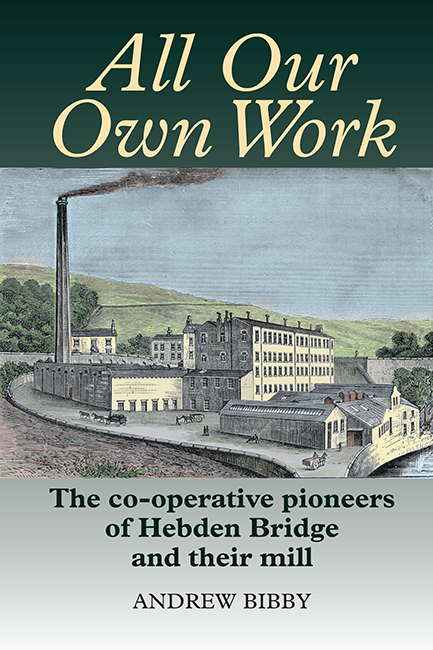

Details of all my books are available on this website. I have also archived on this site a wide range of newspaper articles and reports which I have written over the years. This includes work undertaken for a number of international and national organisations and for UK newspapers including The Observer, The Independent, The Guardian and Financial Times. If you wish to access anything from this archived material, please go to my home page.
Contact Andrew Bibby
All Our Own Work
The textile workers who ran their own co-operative mill

Merlin Press, 2015 (second edition under preparation)
Driven by a desire to create their own employment under
their own control, the textile weavers, cutters and machinists in the small
Pennine town of Hebden Bridge developed a successful co-operative business which employed over 300 women
and men at its peak and ran for almost fifty years - each and every year
making a profit.
Creating, almost for the first time, a new way of
working wasn’t always easy. There were debates on how to share the rewards
of the business, and on how much power those who provided the capital should
be given. There was discussion on appropriate management and governance
structures. There were dilemmas to face: should the mill produce quality
products or poorer goods that sold better?
This engrossing account of a worker-run business is the
first significant study of early producer co-operatives in
"As co-operatives and mutuals return to the top of the economic, political and social agenda world-wide, the Hebden Bridge Pioneers need remembering alongside their Rochdale contemporaries. This is a wonderful, timely celebration of their achievements, and their contribution to modern debates within the wider co-operative movement. Bibby's book is essential reading." - Prof Stephen Yeo
"This is not just a readable and fascinating history but also a well-timed account of dilemmas that new co-operatives still have to face, especially those in the worker co-op sector and in the various hybrid co-operatives that have emerged in recent years" - Spokesman
"A history so worth the telling... Bibby is to be congratulated on providing a carefully researched, organised and contextualised history" - NW Labour History Journal
"This is a wide-ranging work of scholarship, based on extensive research in both archives and printed sources which are fully listed at the back in a comprehensive bibliography. There are also 22 black and white illustrations and a detailed index." - Family and Community History
"In this important book by one of our most knowledgeable writers on co-operative affairs, Andrew Bibby tells the story of an ambitious producer co-operative's rise and subsequent absorption by the CWS with great élan (and with 605 meticulous footnotes)... The book is also an invaluable corrective to the almost exclusive attention that consumer-based distributive co-operation has received in the literature and as such deserves to be widely read within, and beyond, the movement." - Journal of Co-operative Studies
Return to Andrew Bibby's home page